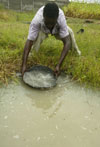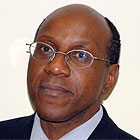"Exclusive Interview with Morgan Tsvangirai


Imagine yourself working side by side each day with a man who -- for the last decade -- has repeatedly arrested you, charged you with treason, detained and beaten your friends, and may have plotted your assassination just a year earlier. You are prime minister and he is president, even though your party won elections to oust him from power last year. The fates of an entire country and 11 million people depend on your having a good working relationship. And now imagine that the country has multi-million-percent inflation, hundreds dying from cholera, and a pattern of political violence that has chased thousands out of the country in recent years.
Welcome to the life of Morgan Tsvangirai, prime minister of Zimbabwe and leader of the opposition Movement for Democratic Change (MDC). Since September, Tsvangirai has endured grueling negotiations to set up a power-sharing government with President Robert Mugabe and his party, ZANU-PF. Three months into its operation, the pace of progress is slow, Tsvangirai told Foreign Policy's Elizabeth Dickinson. Remaining disagreements over the appointment of ministers, the ongoing arrest of activists and journalists, and basic day to day operations have plagued the arrangement. Donors in the West have refused to send aid to the broke Zimbabwean government so long as Mugabe is still at the reins. Still, Tsvangirai is thinking big about how to get the country back on track. An economic plan will aim to get the country functioning again over the next 100 days -- tackling even the contentious issue of land redistribution. In short, Tsvangirai says, "Ours is the transformative challenge: to transform old habits and introduce a new governance culture, and you know it's difficult in a coalition government."
Foreign Policy: How did it feel on day one, walking into the position of prime minister knowing all the challenges before you? What did it feel like?
Morgan Tsvangirai: It is obvious the level of economic degeneration that just hit us in the face when we went into government. There was a sense of euphoria, which was very short-lived because the decision to go in was influenced by a number of factors, one of which was that we could not be authors of chaos, and that if there was chaos in the country the outcome would be unpredictable; it would engulf us all. So, yes, there was a sense that we have made the right decision, but we didn't know what we were going into.
FP: You said yesterday that elements of ZANU-PF are holding up the progress of the unity government. Can you update us on the status of talks to resolve these remaining issues -- for example, the position of the Central Bank governor?
MT: The discussions amongst the principles are going very well; we certainly hope that tomorrow we'll be making an announcement on the outstanding issues. You must be conscious that this is a coalition government. There are sensitivities and emotions that need to be navigated and negotiated. One would be a bit overambitious to expect everything we're grappling with to be resolved within three months.
It's frustratingly slow, in our assessment, that we have gone this far without at least indicating how the outstanding issues will be resolved. But I'm glad to say that we have made progress. The issues that we have agreed upon -- and those we are still in disagreement about -- will be announced to the nation so that the nation is able to make an assessment as to if there has been progress or not.
FP: You have shown an incredible spirit of reconciliation -- saying on Friday, "Robert Mugabe was part of the problem but he is also part of the solution, whether you like it or not." But are Zimbabweans ready for that kind of reconciliation?
MT: There is a sense of cautious optimism that this inclusive government will be a successful experiment because no one wants to go back to the November, December, January, situation. So therefore, when you present national union as one of the democratic challenges, people accept that there is need for national healing for progress. But of course, there has to be a process of that national healing, otherwise people will continue to [have] that frustration.
FP: President Robert Mugabe has a sinister reputation in the United States and elsewhere. But are there things that the West is failing to understand about Mugabe?
MT: I'm sure this perception is what has been built up over the years -- some of which is a reality. But one of the underlying things is that I am prepared to work with President Robert Mugabe -- not because he's right but because of the national interest: We would work with anybody who wants to push the national agenda forward. But instead of [the international community] taking a cue from us as to how to proceed, it would appear that people have made this judgment [not to help], and they have thrown out the baby with the bath water.
FP: How do you react to donors when they tell you that they can't give aid to Zimbabwe yet, until more democratic progress is made?
MT: My beef with all the international community and diplomats is that, look, those of us who are pushing the democratic reform agenda should be supported so that we can sustain this experiment.
I was saying to somebody this morning that it would appear that by raising the bar every time there is progress -- or every time there is an attempt [by the international community] to ignore the progress that has taken place because of one or two [outstanding] issues [unresolved in the coalitional government], you are invariably becoming a part of the [internal government] negotiations. And for the negotiating parties who are actually on the field, who are negotiating with ZANU-PF, you actually go to the extent of undermining the influence that we are trying to build among those skeptics [of international aid] inside the country.
FP: You've announced a new 100-day economic recovery plan. Can you tell us some of the things that will be happening as part of that plan?
MT: I'm sure that you know that we've just completed the first three months of this inclusive government, and the first phase was to try and consolidate the government, which I believe has now been achieved.
Now we go to the second phase in the next three months. It's a short-term program to try to intervene in various areas of our economy. And there are really five clusters: economic, social, infrastructure, rights, and security. We have done [this division] in order to build the priority programs in each ministry with the key results areas in target -- the milestones. So I would say that the next 100 days, the key priorities are to set the policy framework in various ministries; to ensure that we are able to rehabilitate some of the dilapidated infrastructure; and to ensure that the education and health delivery systems are on their feet. But above all, we need to mobilize the resources so that we can support these programs. So the 100-day plan is a test of the synergies within ministries -- across ministries -- to ensure that the whole government is working as a cohesive team.
FP: Where does land reform fit into this plan?
MT: In the 100 days, what we would expect from the Ministry of Land is first and foremost to do an assessment -- a country-wide assessment on the so-called land invasions [that occurred under Mugabe's previous government] -- if there are still any. The second part is to set up a land audit in terms of the global political agreement, a land audit that is meant to reveal whether the independent land commission is the basis to do proper land reform. We've got a plan on the land, and I think this is the only way that this issue will be finalized.
FP: In spite of your own resolve, is it difficult to motivate other members of the MDC in light of so many challenges?
MT: We have to keep focused. We know that from time to time, some of the old habits of violence will remain. But we don't lose focus on the need to create a democratic playing field so that when the new constitutional dispensation is created -- we can hold free and fair elections down the line. That's still the objective.
In other words, ours is the transformative challenge: to transform old habits and introduce a new governance culture, and you know it's difficult in a coalition government. But we know that within the transitional phase, it is important to unlock some of these mindsets that have taken us this far down. So how do I motivate our people? Our people know that we have not yet arrived as a full democratic Zimbabwe. But we are on the journey.
Morgan Tsvangirai is prime minister of Zimbabwe."


 Peter Schiff, the EuroPacificCapital chief that's been a fierce bear on the dollar, slammed the latest fed move in an interview with
Peter Schiff, the EuroPacificCapital chief that's been a fierce bear on the dollar, slammed the latest fed move in an interview with 















































